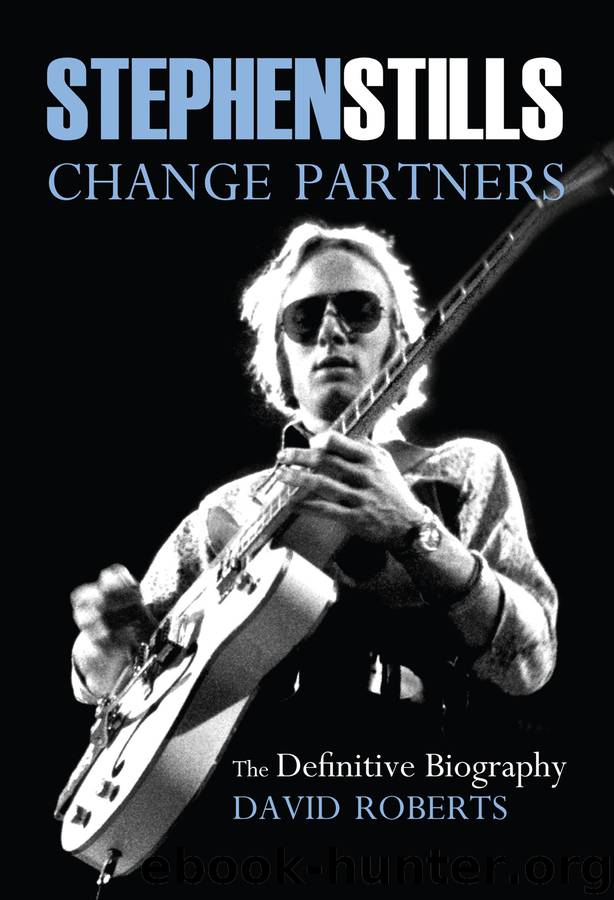Stephen Stills by David Roberts

Author:David Roberts
Language: eng
Format: epub
Publisher: This Day in Music Books
Published: 2018-05-29T16:00:00+00:00
On November 16, 1970, Stephen Stills was released in US music stores, and a couple of weeks later in the UK.
When a reviewer tries to backtrack a little by adding the words “I’m not saying I don’t like this album,” you know the general endorsement isn’t going to be a ringing one.
Stills’ debut solo album didn’t get a pasting from Rolling Stone–Ed Ward even went as far as saying that “‘Love The One You’re With’ will make a killer single”–but the dismissive closing words “But when it’s over, I put something meatier on” suggested Stephen Stills was a collection of samey pop songs.
This would be the first, but certainly not be the last time Stills the solo artist would suffer less than enthusiastic Rolling Stone reviews.
As for the rest of us, we pretty much all liked Stephen Stills greatly. As already detailed, the songs were good, the guest performers were the cream of contemporary rock, blues, and R&B, and the single ‘Love The One You’re With’ would be a radio and chart smash hit, not only in the US but also in Stephen’s adopted UK home.
Billboard was gushing in its praise and described Stephen as “a genius for absorbing influences and surpassing them through his own powerful creativity.” The all-star support and “brilliant arrangements,” it added, “takes rock to new musical heights on ‘Love The One You’re With,’ ‘Go Back Home,’ and ‘Cherokee.’”
Over the winter of 1970/71, the album peaked at Number 3 in the US (Number 8 in the UK) and ‘Love The One You’re With’ made Number 14 in the US (Number 37 in the UK). Stephen wasn’t satisfied, as he told Creem: “My first album would have been a Number 1 record if George Harrison hadn’t come out right behind me with All Things Must Pass.”
He did beat his old rival Neil Young though. Young’s After The Gold Rush stalled at Number 8 on the Billboard albums chart, although this was the point at which Neil’s career would begin to outstrip Stephen’s, and David and Graham’s for that matter. Neil’s chart-topping Harvest was up next in 1972, and by then he would wield considerably more power in the will-they-won’t-they reformations of Crosby, Stills, Nash & Young.
Download
This site does not store any files on its server. We only index and link to content provided by other sites. Please contact the content providers to delete copyright contents if any and email us, we'll remove relevant links or contents immediately.
| Classical | Country & Folk |
| Heavy Metal | Jazz |
| Pop | Punk |
| Rap & Hip-Hop | Rhythm & Blues |
| Rock |
Cecilia; Or, Memoirs of an Heiress — Volume 2 by Fanny Burney(31957)
Cecilia; Or, Memoirs of an Heiress — Volume 3 by Fanny Burney(31943)
Fanny Burney by Claire Harman(26605)
We're Going to Need More Wine by Gabrielle Union(19050)
Plagued by Fire by Paul Hendrickson(17416)
All the Missing Girls by Megan Miranda(16037)
Cat's cradle by Kurt Vonnegut(15362)
For the Love of Europe by Rick Steves(14148)
Bombshells: Glamour Girls of a Lifetime by Sullivan Steve(14078)
Leonardo da Vinci by Walter Isaacson(13339)
4 3 2 1: A Novel by Paul Auster(12396)
The remains of the day by Kazuo Ishiguro(9002)
Adultolescence by Gabbie Hanna(8929)
Note to Self by Connor Franta(7672)
Diary of a Player by Brad Paisley(7584)
Giovanni's Room by James Baldwin(7350)
What Does This Button Do? by Bruce Dickinson(6208)
Ego Is the Enemy by Ryan Holiday(5453)
Born a Crime by Trevor Noah(5384)
